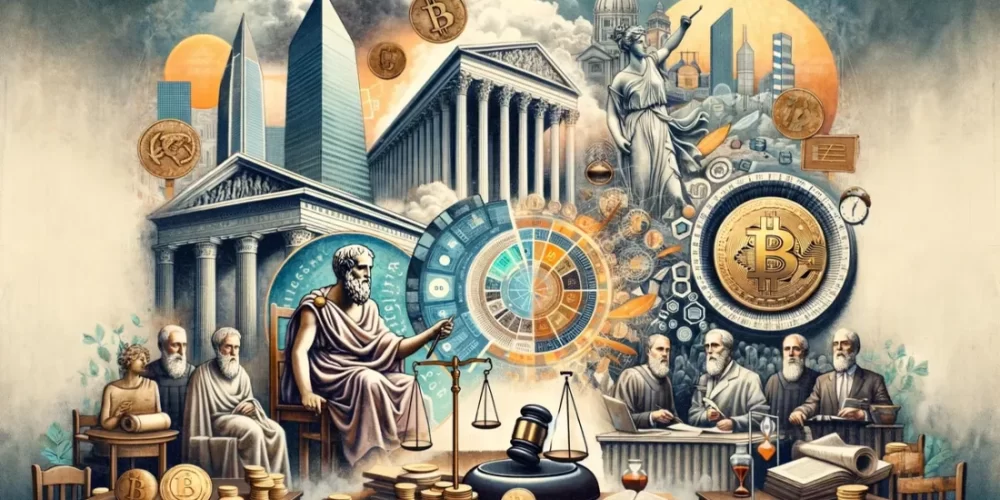Discovering usury via historical meanderings through the times of Aristotle, religious beliefs, a life-saving Russian NKVD interrogation, and a dead United States Justice of the Peace.
Usury – noun:
The practice of lending money and charging the borrower interest, especially at an exorbitant or illegally high rate.
Derived from the Latin word, usura, the practice of usury has been discussed amongst philosophers, economists, and religions for thousands of years. Aristotle discussed usura in his book Politic in the year 350 BC, where he outlined the three ways to make money.
Knowledge of livestock
Which are most profitable, and where, and how- as, for example, what sort of horses or sheep or oxen or any other animals are most likely to give a return. A man ought to know which of these pay better than others, and which pay best in particular places, for some do better in one place and some in another.
Service for hire
Being employed in the mechanical arts, the other in unskilled and bodily labour.
Usury
The most hated sort, and with the greatest reason, is usury, which makes a gain out of money itself and not from the natural object of it. Money was intended to be used in exchange, but not to earn interest. And this term interest, which means the birth of money from money, is applied to the breeding of money because the offspring resembles the parent. Therefore, of all the modes of getting wealth, this is the most unnatural.
No holding back there from Aristotle!
Throughout the centuries, we can find many more documented thoughts and beliefs about the practice of usury in society.
In the religious texts of Christian and Islamic beliefs (usury translates to Riba in Arabic), we find many mentions of the negative stance towards this practice.
Exodus 22:25
If you lend money to any of my people with you who is poor, you shall not be like a moneylender to him, and you shall not exact interest from him.
You shall not charge interest on loans to your brother, interest on money, interest on food, interest on anything that is lent for interest.
In Islam, Riba is explained as an ‘exploitative means of increasing one’s wealth.’ This is because a person with surplus money lends it to someone in desperate need of it.
Islamic scholars have always been in unanimous agreement on the matter of interest. Whether it’s interest received in a bank account or a loan for buying property or for education, as long as it includes interest, it’s forbidden.
Riba is haraam (forbidden) for the one who receives it, and the one who pays it. It is also haraam to facilitate Riba it in any way whatsoever.
Surah Al-Baqarah 2:278
O you who have believed, fear Allah and give up what remains due to you of interest, if you should be believers.
Buddhism also takes a dim view of the practice of usury.
One discerns wrong livelihood as wrong livelihood, and right livelihood as right livelihood. And what is wrong livelihood? Scheming, persuading, hinting, belittling, and charging interest. This is wrong livelihood. – Siddharta Gautama Buddha.
So how do we now live in a world where usury is used in society every second of every day?
How have we fallen so far from the philosophical and political beliefs of Aristotle and the shared religious beliefs from around the world?
For the last 10 years, I have read many books on the history of money and explored the financial and banking system, but no book has left me more astounded than Red Symphony, which isn’t a book in the strictest sense, but a transcript.
That needs highlighting again. It is a transcript.
A transcript of a conversation that took place on the 26th of January 1938, between Gavril Kus’min and Christian Rakovsky.
Kus’min was Stalin’s NVKD agent and key interrogator. Rakovsky had been the Russian Ambassador to France and was to be executed the next day unless he could disclose information to his interrogator that would be of use to Stalin.
During their conversation, Rakovsky began to expose the international financiers who had successfully captured the financial system for their own gain and to plunge humanity into being the financiers’ debt slaves.
Below is the part of the transcript that is most pertinent to this article:
Rakovsky: Allow me not to reply just now, so as not to interrupt the logical sequence… I only want to decipher the basic axiom: money is power. Money is today the centre of global gravity. I hope you agree with me?
Kus’min: Continue, Rakovsky, I beg of you.
Rakovsky: The understanding of how the financial International has gradually, right up to our epoch, become the master of money, this magical talisman, which has become for people that which God and the nation had been formerly, is something which exceeds in scientific interest even the art of revolutionary strategy since this is also an art and also a revolution. I shall explain it to you.
Historiographers and the masses, blinded by the shouts and the pomp of the French Revolution, the people, intoxicated by the fact that it had succeeded in taking all power from the King and the privileged classes, did not notice how a small group of mysterious, careful and insignificant people had taken possession of the real Royal power, the magical power, almost divine, which it obtained almost without knowing it. The masses did not notice that the power had been seized by others and that soon they had subjected them to a slavery more cruel than the King, since the latter, given his religious and moral prejudices, was incapable of taking advantage of such a power. So it came about that the supreme Royal power was taken over by persons, whose moral, intellectual and cosmopolitan qualities did allow them to use it. It is clear that these were people who had never been Christians, but cosmopolitans.
Kus’min: What is that for a mythical power which they had obtained?
Rakovsky: They had acquired for themselves the real privilege of coining money…
Do not smile. Otherwise, I shall have to believe that you do not know what moneys are!
I ask you to put yourself in my place. My position in relation to you is that of the assistant of a doctor, who would have to explain bacteriology to a resurrected medical man of the epoch before Pasteur. But I can explain your lack of knowledge to myself and can forgive it. Our language makes use of words which provoke incorrect thoughts about things and actions, thanks to the power of the inertia of thoughts, and which do not correspond to real and exact conceptions.
I say: money.
It is clear that in your imagination there immediately appeared pictures of real money of metal and paper. But that is not so. Money is now not that, real circulating coin is a true anachronism. If it still exists and circulates, then it is only thanks to atavism, only because it is convenient to maintain the illusion, a purely imaginary fiction for the present day.
Kus’min: This is a brilliant paradox, risky and even poetical.
Rakovsky: If you like, this is perhaps brilliant, but it is not a paradox.
I know — and that is why you smiled — that States still coin money on pieces of metal or paper with Royal busts or national crests; well, so what?
A great part of the money circulating, money for big affairs, as representative of all national wealth, money, yes money, it was being issued by those few people about whom I had hinted.
Titles, figures, cheques, promissory notes, endorsements, discounts, quotations, and figures without end flooded States like a waterfall. What are in comparison with these, the metallic and paper moneys?
Something devoid of influence, some kind of minimum in the face of the growing flood of the all-flooding financial money.
‘They’, being the most subtle psychologists, were able to gain even more without trouble, thanks to a lack of understanding. In addition to the immensely varied different forms of financial moneys, they created credit-money with a view to making its volume close to infinite. And to give it the speed of sound… it is an abstraction, a being of thought, a figure, number, credit, faith…
Do you understand already?… Fraud! false moneys given a legal standing, using other terminology, so that you should understand me.
Banks, the stock exchanges and the whole world financial system is a gigantic machine for the purpose of bringing about unnatural scandals, according to Aristotle’s expression; to force money to produce money, that is something that if it is a crime in economics, then in relations to finances it is a crime against the criminal code, since it is usury. I do not know by what arguments all this is justified: by the proposition that they receive legal interest. Even accepting that, and even that admission is more than is necessary, we see that usury still exists, since even if the interest received is legal, then it invents and falsifies the non-existent capital.
Banks have always by way of deposits or moneys in productive movement a certain quantity of money which is five or perhaps even a hundred times greater than there are physically coined moneys of metal or paper. I shall say nothing of those cases when the credit-moneys, i.e. false, fabricated ones, are greater than the quantity of moneys paid out as capital.
Bearing in mind that lawful interest is fixed not on real capital but on non-existing capital, the interest is illegal by so many times as the fictional capital is greater than the real one.
Bear in mind that this system, which I am describing in detail, is one of the most innocent among those used for the fabrication of false money. Imagine to yourself, if you can, a small number of people, having unlimited power through the possession of real wealth, and you will see that they are the absolute dictators of the stock-exchange; and as a result of this also the dictators of production and distribution and also of work and consumption. If you have enough imagination then multiply this, by the global factor and you will see its anarchical, moral and social influence, i.e. a revolutionary one… Do you now understand?
Kus’min: No, not yet.
Rakovsky: Obviously it is very difficult to understand miracles.
Kus’min: Miracle?
Rakovsky: Yes, miracle. Is it not a miracle that a wooden bench has been transformed into a temple? And yet such a miracle has been seen by people a thousand times, and they did not bat an eyelid, during a whole century.
Since this was an extraordinary miracle that the benches on which sat the greasy usurers to trade in their moneys, have now been converted into temples, which stand magnificently at every corner of contemporary big towns with their heathen colonnades, and crowds go there with a faith which they are already not given by heavenly gods, in order to bring assiduously their deposits of all their possessions to the god of money, who, they imagine, lives in the steel safes of the bankers, and who is preordained, thanks to his divine mission to increase the wealth to a metaphysical infinity.
Drop the mic Christian G. Rakovsky.
This conversation went on to discuss many more topics as Rakovsky opened up to his interrogator. You will not be surprised to learn that Rakovsky’s wisdom and insights were fed back to Stalin, which ultimately saved his life.
Let’s revisit a passage from the above conversation:
Kus’min: What is that for a mythical power which they had obtained?
Rakovsky: They had acquired for themselves the real privilege of coining money…
Do not smile. Otherwise, I shall have to believe that you do not know what moneys are!
Rakovsky is trying to hammer home the point that it’s the monopoly in money creation and the related coercion and deception that is not just criminal and unethical, but also where the rot begins to creep into and shape society.
The current financial system works against us to perpetually inflate the amount of money in the system, constantly debasing the purchasing power of our hard-earned money.
Let’s take an everyday example that many people can connect with, taking out a mortgage for a home.
The first thing to understand here is that the current cost of buying a house is exorbitant, which is a direct consequence of the trap set by those that Rakovsky described. To earn the right to take out a mortgage, you must first make a deposit. This deposit is usually a large sum of money, representing many years of the time and energy you expended to acquire it. In many cases, this could be somebody’s life savings.
Once that money is deposited to the bank issuing the loan, the bank can fractionally reserve that amount.
Wait, what?
The bank only has to keep a fraction of every dollar it gets, generally anywhere between 0% and 10%, depending on where you live and the current policy of that central bank. In the USA, it’s currently zero. Yes, zero.
From the Federal Reserve’s website:
Reserve Requirements As announced on March 15, 2020, the Board reduced reserve requirement ratios to zero percent effective March 26, 2020. This action eliminated reserve requirements for all depository institutions.
The next part of this process is still very difficult to come to terms with, but as pointed out by Rune Ostagrd in his book Fraud Coin, banks do not use depositors’ money to issue loans as per the report from the Bank Of England – Money Creation In The Modern Economy By Michael McLeay, Amar Radia, and Ryland Thomas of the Bank’s Monetary Analysis Directorate. They note:
One common misconception is that banks act simply as intermediaries, lending out the deposits that savers place with them.
Further,
Saving does not by itself increase the deposits or ‘funds available’ for banks to lend. Indeed, viewing banks simply as intermediaries ignores the fact that, in reality in the modern economy, commercial banks are the creators of deposit money. This article explains how, rather than banks lending out deposits that are placed with them, the act of lending creates deposits — the reverse of the sequence typically described in textbooks
Yes, read that again, the act of lending creates deposits.
This results in what is termed the multiplier effect, which means that the initial deposit can result in much larger amounts of money in circulation within the banking system. As more loans are taken out by individuals, residential properties rise in price as a result of the increased money supply. As the property increases in value, more individuals can borrow against their property as collateral to buy bigger or more desirable property. Now apply this on a grand scale and realise that this is happening every minute of every day, not just with property but for the many other reasons that individuals might apply for bank loans.
This increase in the money supply has an insidious effect of raising the prices of the goods and services that we need or desire, as more money in the system spurs consumerism, sending a false demand signal to the market.
Mainstream economic teaching still pushes the basic belief that inflation occurs when the aggregate quantity of goods demanded at any particular price level rises more quickly than the aggregate quantity of goods supplied at that price level.
However, as explained above, an increase in the base monetary supply offers a differing definition of the economic term ‘inflation’ and is much more understandable as to what causes the prices of goods and services to rise.
Now, with our newfound knowledge of how the banks deposit the loan into your bank account, let’s get back to the example of the mortgage and usury.
Your deposit has been made, and the bank ‘loans’ you the rest of the money by creating a deposit in your bank account for the transaction of the house purchase. This ‘loan’ is what they will charge you interest on.
This is usury in its purest form.
Let’s revisit what Rakovsky revealed in the above passage:
Bearing in mind that lawful interest is fixed not on real capital but on non-existing capital, the interest is illegal by so many times as the fictional capital is greater than the real one.
So, even if a person has willingly agreed to the interest rate offered by the bank, the very fact that it is an interest rate levied on money the issuer didn’t have is usurious and criminal.
Now, at this point, you might be getting pretty angry at how we have been tricked into participating in a scheme designed to enrich those who issue loans from thin air and then charge us interest on it. One might think that people should stand up and fight against this fraudulent behaviour. Well, one such person did, and his case has been widely studied.
Known as the Credit River Case, the basic facts of this December 1968 case are fairly straightforward. Defendant Jerome Daly owned property in Scott County, Minnesota, on which he had a mortgage with the Plaintiff First National Bank of Montgomery. Daly fell behind on his mortgage payments, leading the bank to foreclose on the property. The bank sought to evict Daly and take possession of the property.
Daly, a trained lawyer, represented himself and based his defence on the argument that the bank had not actually loaned him any money but had simply created credit on its books. Daly argued that the bank had not given him anything of value and, accordingly, was not entitled to the property that secured the loan.
The jury and the justice of the peace, Martin V. Mahoney, agreed with this argument. The jury returned a verdict for the defendant, and the justice of the peace found the mortgage null and void, declaring that the bank was not entitled to possession of the property. The decision meant that Daly did not have to pay the mortgage debt nor relinquish the property to the bank.
The bank timely appealed, and the decision was nullified on the grounds that, as a justice of the peace, Martin V. Mahoney lacked the authority to enter such a ruling. The district court agreed, meaning that Daly had to pay the mortgage debt or relinquish the property to the bank. It is unclear whether Daly ever appealed this matter to the Supreme Court of Minnesota.
Alas, there is more to the story.
During the bank’s appeal, Daly wrote in a local news article: “This decision, which is legally sound, has the effect of declaring all private mortgages on real and personal property, and all U.S. and State bonds held by the Federal Reserve, National, and State banks to be null and void. This amounts to the emancipation of this Nation from personal, national, and state debt purportedly owed to this banking system. Every American owes it to himself to study this decision very carefully, for upon it hangs the question of freedom or slavery.
Ultimately, Daly was disbarred and banned from practising law ever again.
And, adding to the mystery, Justice Of The Peace Mahoney was found dead on 22 August 1969. The circumstances surrounding his death remain unresolved, and no amount of internet sleuthing can find much information about it.
Allegedly, Mr Mahoney died on a fishing trip whilst ‘intoxicated.’
He was aged 55.
Make of those facts what you will. It’s not in this author’s interest to speculate any further than what facts have been made available.
Perhaps we can conclude that if one were to take a bank to court, attempting to justify the non-repayment of a fractionally reserved interest-bearing loan, that person would lose.
So, what can you do to protect yourself against usury in the financial system and a legal system that has been designed and manipulated not to uphold the truth?
Simple, you opt out.
Walk away from the table. Why would you sit there being perpetually beaten by rulers who change the rules to benefit themselves?
Under this regime, which is the same in almost all countries worldwide, we stand no chance of true prosperity and ethical distribution of wealth. Entrepreneurs, savers, and consumers are left without any apparent signal, no real idea of value, and no guiding star. We have yet to learn what a truly civilised world could look like, because the monetary system is civilisation’s foundation, and the legal system is a layer of civilisation built on top of the monetary system.
To ensure prosperity, we must design a completely different form of money that stores value, rather than loses value over time. A monetary system beyond the control of any centralised power. A means of exchange that runs on an open, easily verified economic system. We need a money that is global and available to anyone of any age from any race or religion without permission. A store of value that becomes increasingly scarce and desirable over time — an instrument that is difficult to confiscate or steal. Embedded in this new system is a money that could be sent digitally in a matter of seconds to cater for the needs of people living in a modern, interconnected, and highly interdependent civilisation.
Thankfully, this money has been available to us since 3 January 2009.
It works, and it has protected millions of people and their families around the world.
The money is bitcoin.
Your educational journey starts here.
Daniel Prince.
Host of the Once Bitten Bitcoin podcast.
Author of Choose Life.
Huge thanks to these amazing Bitcoin Plebs for helping me edit this article! Mel Shilling – @Mel_shilling Rune Ostgard – @enur72
And to @Omnifinn and the whole Konsensus family for publishing the article – @KonsensusN
Find books about Bitcoin here: bitcoinbook.shop/?ref=BITTEN – Use the code BITTEN at checkout for a 10% discount.
Sources and further reading
- https://www.thefreedictionary.com/usury
- https://www.federalreserve.gov/monetarypolicy/reservereq.htm
- https://classics.mit.edu/Aristotle/politics.mb.txt
- https://cupola.gettysburg.edu/cgi/viewcontent.cgi?article=1034&context=ger
- https://www.theislamicquotes.com/islamic-quotes-on-interest/
- https://archive.org/details/red-symphony
- https://en.wikipedia.org/wiki/First_National_Bank_of_Montgomery_v._Daly
- https://www.goodreads.com/book/show/30459727-behind-the-curtain
- https://www.reddit.com/r/Superstonk/comments/o7ebv8/this_is_a_true_story_about_jerome_daly_taking_on/
- https://mn.gov/law-library/legal-topics/copy-of-credit-river-case.jsp
- https://www.bankofengland.co.uk/-/media/boe/files/quarterly-bulletin/2014/money-creation-in-the-modern-economy.pdf










